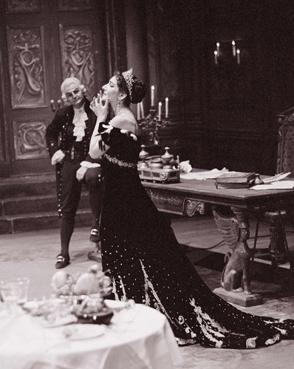
Callas as Tosca
The anniversary of Callas' birth seems an appropriate time to flesh out my long-hoarded thoughts on this subject. For Maria Callas, of glorious memory, of eternally astonishing voice, is often cited as the paragon to crown all paragons. There's an astonishing variety of roles for which, in discussions of their performance history, her name is inevitably mentioned, in accents of hushed or ecstatic reverence. She is, for many, the diva, La Divina, ne plus ultra. I'm not exempt from the impulse to adore. Her Tosca was the first CD set I bought for myself, and others have joined it since (there's a fuller panegyric here.) In part, perhaps, because of her preternaturally polished off-stage glamour, Callas has come to be a potent and multivalent symbol. She is, sometimes, the essential Diva, the goddess, having become the perfect woman by her transcendence -- or transmutation? -- of female fickleness and frailty. She is, sometimes, the symbol of glories past, never to be attained by the present and degenerate generation. She is, sometimes, the incarnation of opera's astonishing ability to simultaneously surmount and express the anguish of the human condition.The first of these posited images is one I set aside for now; the gendering of how opera singers are adored is a complex subject, worthy of consideration in its own right. The latter two, while presented here as different options, often appear intertwined. They are, however, ideas which I believe should be in tension. The tendency to idolize previous generations of artists at the expense of current ones is a pervasive one, and, notably, one which has endured through generations of opera audiences as well as singers; Nilsson, be it remembered, was head-shakingly compared to Flagstad. Does this have to do with how we hear them? As immortally preserved on records or as fallible, variable, human? I suspect it may. But there is also a tendency -- perhaps less universal than I suppose it -- to view part of opera's unique magic as dependent on the very fragility of the human voice, the vertiginous, thrilling, sometimes terrifying immediacy of seeing Tristan or Tosca or Sesto or Amneris embodied and voiced by mere mortals.
The tendency to glorify past incarnations at the expense of present ones certainly has many contributing factors... not least among them, I fear, the increasing precarity of existence for most artists seeking to make their way. But I still look for ways of dismantling it. This is in part a selfish desire. I want to hear and absorb the accounts of older opera-goers without having to deprecate current singers. Decades from now, when I am myself an aged opera-goer, I anticipate the desire to say something along the lines of "Ah yes, Bryn Terfel's Scarpia..." I also want, now, to celebrate young singers and the work they are doing, not least in expanding the operatic canon. Looking at this in the cold light of reason, it may seem a problem easily resolved, through simple rhetorical devices, the expression of preferences and opinions in non-absolute terms. De gustibus non disputandum est. But this is, after all, opera. Among the elements of the human experience exalted and celebrated and sung of in this glorious art form, looking at things in the cold light of reason does not feature prominently. This is how I look at it: in some awe, in occasional frustration, in gratitude, and with simultaneous impulses towards enthusiasm and analysis. Tell me about your own opera-related attitudes, Gentle Readers.

